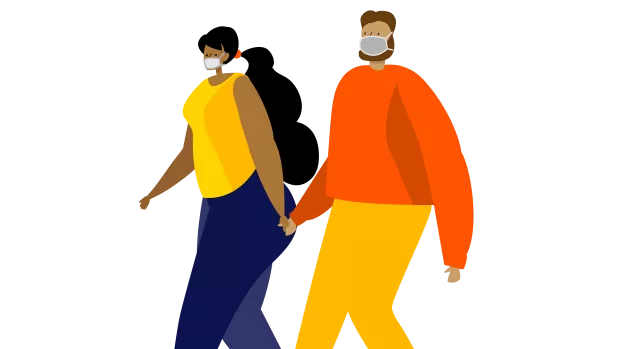
Long COVID and multiple sclerosis (MS)
Some of the symptoms of ‘long COVID’ are similar to MS symptoms. And people with multiple sclerosis could be more likely to have a slow recovery from COVID-19.
So let your doctor or MS team know about new or changing symptoms.
What is long COVID?
Long COVID usually means you’ve had new or ongoing COVID-19 symptoms for 12 weeks or more. Doctors sometimes call this ‘post-COVID-19 syndrome’.
But confusingly, not everyone means the same thing when they say ‘long COVID’.
It’s also used sometimes to mean symptoms have gone on for 4 weeks or more. Doctors might call this ‘ongoing symptomatic COVID-19’.
On this page, when we say long COVID we’re talking about symptoms after 12 weeks.
Are long COVID symptoms the same as MS symptoms?
Some common long COVID symptoms can also be seen with MS, including:
- fatigue
- dizziness
- tingling and numbness
- changes to memory or thinking
- anxiety
- depression
Long COVID can also cause shortness of breath, heart palpitations and joint pain.
To find the best way to manage a symptom, it’s important they’re not automatically assumed to be either MS or long COVID.
Am I more likely to get long COVID if I’ve got MS?
Early research shows that in general people with MS are not more likely to get COVID-19.
But a 2021 research study suggests that if you get it, you might be more likely to have a slower recovery. In particular, if you had mental health problems before getting COVID-19, or higher levels of physical disability.
In the research study, the most common long COVID symptom for people with MS was fatigue. Other common long COVID symptoms for these people with MS were coughs, shortness of breath or heaviness in the chest.
Read the full 2021 research paper about long COVID and MS
How can I manage long COVID symptoms and MS?
Let your doctor or MS team know about new or changing symptoms so they can help you find the best way to manage them.
Like MS symptoms, long COVID affects people differently, but it can have an impact on mental and physical health.
Depending on how you’re affected, you might be referred to a long COVID clinic.
Some lifestyle changes could help recovery from long COVID, including eating and sleeping well and having regular exercise or activity when that’s practical.
Coming to terms with new or changing symptoms can take time, alongside dealing with their impact day to day. Your doctor or MS team can also help find support for the emotional effects and mental health difficulties.
If you’d like to talk to someone, call our MS Helpline team on 0808 800 8000.
The charity Rethink has more about mental health and long COVID.
Find out more about support for long COVID in your nation:

